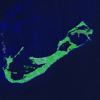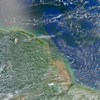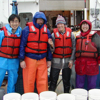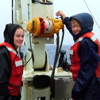
The Pal-LTER program is an ongoing study of how climate change impacts the marine ecosystems of the Antarctic peninsula.


The Pal-LTER program is an ongoing study of how climate change impacts the marine ecosystems of the Antarctic peninsula.

This study of plankton diversity at the Bermuda Atlantic Time-series Study (BATS) site is part of an initiative to create an online atlas of marine diversity, the Ocean Biogeographic Information System.

ANACONDAS is a 3-year study of how the Amazon River's huge freshwater plume affects the biology and chemistry of the Atlantic Ocean. The team's goal is to better understand how ocean plankton and river-borne nutrients interact to affect the global carbon cycle and climate change.

VERTIGO is a collaborative international venture studying processes affecting particle flux in the mesopelagic zone (depths of ~100-1000 m). Knowing the fate of organic material as it sinks from the ocean's surface to its depths is important because it represents a potentially large sink for carbon dioxide, the main greenhouse gas implicated in global warming.

This project, part of a larger multi-institution study, investigates zooplankton in mesoscale eddies. Our goal is to better understand the complex interactions between physics and biology in eddies and to elucidate their role in structuring zooplankton communities and influencing biogeochemical cycling.

DOMINO is a multi-institution project whose goal is to better understand the role that plankton play in the consumption and production of dissolved organic matter in the ocean.